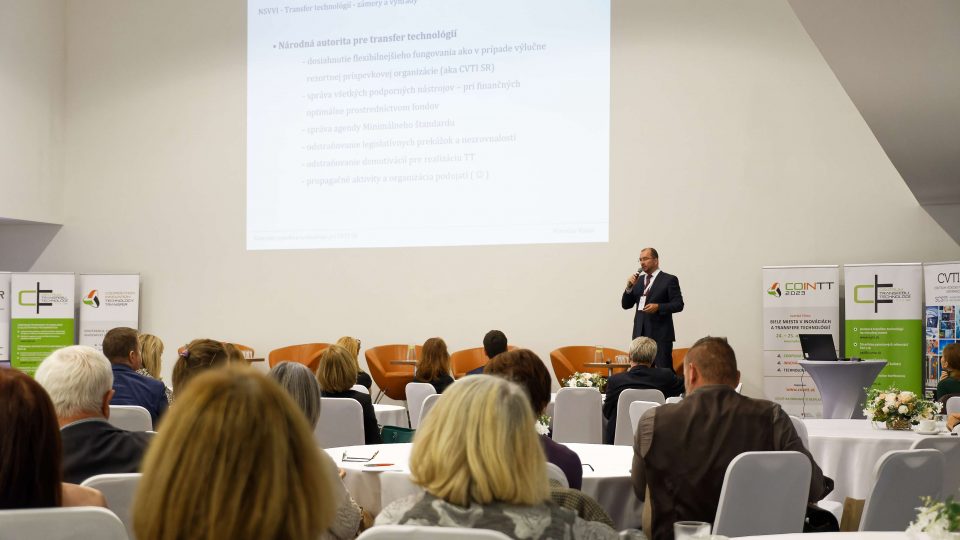On October 24th and 25th, Bratislava hosted already fourth edition of biggest professional conference on technology transfer in Slovakia – COINTT 2023 which main topic was „white spaces“ in innovations and technology transfer in Slovakia.
The main topic covered this year specific areas that, as far as we know, did not have given proper space in discussion about technology transfer in academic environment. We named this topic as white spaces in innovations and technology transfer, i.e., places/areas that were not a matter of anyone´s interest in Slovakia so far. Those are, in particular, issues connected with so called „third mission“ of academic institutions activity – in our case especially in technology transfer area. Key-note speakers also delivered presentations focused on these issues.
Under this third mission we mainly understand setting up tools that enable strategic activity of Slovak academic institutions in technology transfer, including managing their impact on regional development, i.e., long-term obligatory formulation of goals in technology transfer area, ways to reach them and keep their sustainability. It also includes assessment of goals that institution wishes to achieve in region of its activities, internally in own structures as well as in building good reputation in the eyes of partners from private sphere and also on international level.
As the topic is quite new in Slovak academic environment, we were not able to assess particular expectations to the next year for it during the Conference on October 24th and 25th, 2023 that we would be able to evaluate on next edition of COINTT 2024. We had to reserve longer time as two days of COINTT 2023 Conference offered, discuss it with colleagues on meetings and formulate the conclusions. You can find them below together with evaluation of realization of conclusions from previous year 2022.
COINTT 2023 Conference conclusions
- Incorporation of strategic long-term goals in the field of technology transfer by universities into Long-term goals according to Section 2. par. 10 of Act no. 131/2002 Coll. from February 21st, 2002, on higher education and on the amendment of certain laws as amended in the following scope, for example:
- ensuring the functioning of the technology transfer office / ensuring the provision of specific professional services in the technology transfer field by the technology transfer office, the possibility of career advancement in case of successful work in technology transfer office, operation of the institution in spin-off systematization of contract and joint research and consultations
- establishing and utilisation of internal and external financial supportive tools for technology transfer
- ensuring the functioning of the technology transfer office / ensuring the provision of specific professional services in the technology transfer field by the technology transfer office, the possibility of career advancement in case of successful work in technology transfer office, operation of the institution in spin-off systematization of contract and joint research and consultations
- Amendment of Act no. 131/2002 Coll. – addition of §1 par. 4) on topics related to the development of the regional environment through the technology transfer, especially the development of the innovative business base in the region.
- Establishing consensus across academic institutions on the establishment of the accounting value of property in the form of intellectual property created by scientific research institution’s own activity and on the registration of such property in the institution’s accounting:
- obtaining an interpretation/methodological guidance on determining the accounting value and accounting records in intellectual property assets created by the Ministry of Finance of the Slovak Republic’s own scientific research activity.
- identification and establishment of the processes necessary for the management of the academic institution for the correct determination of the accounting value and accounting records of assets in the form of intellectual property in the model internal regulation for academic institutions.
- Creation of a concept of higher education in the field of intellectual property (in the context of innovative management and technology transfer), which will be possible to introduce at Slovak universities in the form of a separate subject differentiated according to the focus roughly on the areas of law, management, technology and science intended for students of all sections of particular universities. In the initial phase of the implementation of this intention, the creation of a working group as a part of the solution to measure 1.2.3.3 of the Action Plan of the National Strategy of Research, Development and Innovation is expected, later followed by the creation of the concept, curriculum and content of the subject in the subsequent phase.
Evaluation of COINTT 2022 Conference conclusions
Based on topics discussed during the COINTT 2022 Conference we have chosen several goals, the achievement of which, in our opinion, was beneficial for Slovakia in 2023. We monitored their realization during 2023 and now we would like to introduce the evaluation of them.
Launch of Regional innovation centre in Banská Bystrica self-governing region to make it able to obtain particular information regarding cooperation between academic institutions in the region with private sector in following areas:
- Education
- master’s thesis, eventually PhD. studies or dual education at high schools
- master’s thesis, eventually PhD. studies or dual education at high schools
- Research and development
- overview of areas in which academic institutions can offer research-development cooperation, overview of the ways in which academic institutions in the region are able to ensure research and development cooperation.
- contacts to technology transfer offices at academic institutions
- Specification and establishing roles of cities as a first contact point with business sector – presenting the services of the regional innovation center in the field of cooperation with the academic sector to entrepreneurs.
Performance evaluation in 2023:
On April 1, 2023, the Regional Innovation Centre (RIC) was established in the Banská Bystrica self-governing region (BBSGR) as a separate department under the BBSK Development Agency, n.o. For the implementation of the plans, it was essential to firstly build personnel capacities, as of today (i.e. 24.10.2023, the date of the COINTT 2023 Conference) RIC has four full-time internal employees. Since its inception, RIC activities have focused on developing talent, supporting entrepreneurship, supporting startups and companies, and actively connecting the actors of the innovation ecosystem in the region.
The regional innovation centre has already organized two events called Innovation Meetup, i.e. meetings of actors of the innovation ecosystem at universities (UMB, TUZVO), where universities introduced their activities and possibilities for cooperation with companies, inter alia also the possibility of cooperation in the creation of master’s or dissertation theses and interest in internships for university students in companies operating in the region. Information about dual education in the region is provided by the Department of Education and Education Reforms, with which RIC actively connects companies in case of interest.
Based on open communication between RIC and universities in the region, there is a regular exchange of information and sharing of experience, which means that RIC employees currently have a sufficient overview of the areas in which academic institutions in the region can offer research and development cooperation, as well as the ways in which academic institutions in the region are able to ensure research and development cooperation. RIC also has contacts on technology transfer offices at academic institutions in the region, but cooperation in this area is still very cautious and underdeveloped due to the obstacles to technology transfer, administrative burden and the complexity of the processes.
RIC employees are in regular contact with Banská Bystrica and Zvolen cities, during the previous months cooperation between the cities was agreed upon in contact with the business sector, the city of Banská Bystrica and the city of Zvolen actively present the activities and services of RIC in BBSGR as part of their activities for/with entrepreneurs.
- Development of a feasible proposal for the establishment of a fund to support innovative start-ups outside of standard market processes (acceleration of the start-up environment)
- fund shall substitute financing from banks and financing by private equity in the very initial phase of its functioning (so called preseed phase)
- Defining minimal conditions in support services for academic institutions for establishing student´s start-up and employees´ spin-off/spin-out enterprises and their involvement into so called Minimal standard (please see below).
- fund shall substitute financing from banks and financing by private equity in the very initial phase of its functioning (so called preseed phase)
Performance evaluation in 2023:
Progress in specified areas not achieved.
- Anchoring particular tasks to solve the problems in technology transfer in strategic documents of Recovery and Resilience plan according to COINTT 2022 Conference participants proposals.
- Defining Minimal standard for disposition of property – intellectual property created from public sources in scientific-research institutions in Slovakia.
- Establishing authority for fulfilment of Minimal standard conditions verification in scientific-research institutions in Slovakia
- Establishing motivating tools (according to NCTT SR model)
- Patent fund
- Proof of Concept fund
- Supplementary support services in technology transfer process
- Establishing persecution tools
- Evaluation of scientific-research institutions in Slovakia
- Financial instruments availability
- Establishing motivating tools (according to NCTT SR model)
Performance evaluation in 2023:
In measure 1.2.3.1 of the National Strategy of Research, Development and Innovation Action Plan, space to the technology transfer area was given in 2023. Along with other areas in this measure, annual funds were budgeted for the technology transfer area until 2030. The specific tasks were discussed extensively with the VAIA (Research and Innovation Authority) staff of the Government Office of the Slovak Republic. Preparatory activities have also started to be implemented for them – a detailed survey of the situation in the field of equipping academic workplaces with guidelines in the technology transfer field, professional performances, technology transfer offices competencies together with financial costs. At the same time, the allocation of special funds from this measure for Slovak Centre of Scientific and Technical Information to solve the tasks of this measure is now being resolved. The goals for these tasks for the year 2024 should be specified in the Contract on the provision of special-purpose funds.
- Implementing legislative changes to eliminate obstacles in technology transfer process according to SCSTI, NCTT SR and Ministry of Finance proposals.
- 176/2004 Coll. – Act on Disposal of Property of Public Institutions
- 278/1993 Coll. – Act on State Property Administration,
- 243/2017 Coll. – Act on Public Research Institutions,
- Verifying possible obstacles in other legislative provisions (e.g., Act on Higher Education, Public Procurement Law).
Performance evaluation in 2023:
Changes in regulations were not adopted in 2023. For 176/2004 Coll. and 278/1993 Coll. the final draft of the amendments was formulated, and an exhaustive explanatory report was drawn up. The legislative change agenda was adopted by VAIA (Research and Innovation Authority), these changes are also in National strategy for Research, Development and Innovations. In the autumn of 2023, VAIA concluded a preliminary agreement on the next procedure with the Ministry of Finance of the Slovak Republic – after a regular government was formed.
- Preparing methodology of easy access use in technology transfer process in cooperation with NCTT SR for scientific-research institutions in Slovakia and its disclosure
Performance evaluation in 2023:
As part of the NITT SK II project, a study on easy access was prepared – Utilising the Easy Access approach in the technology transfer and a conceptual proposal for the implementation of this approach in Slovakia, the essence of which is the free and transparent access to the results of research and development activities of Slovak academic institutions for use in economic practice. The study will be published and accessible on www.nptt.sk portals.


